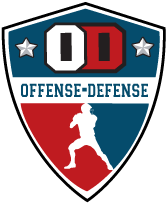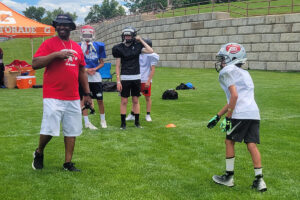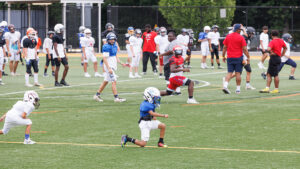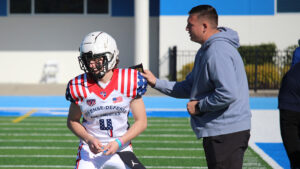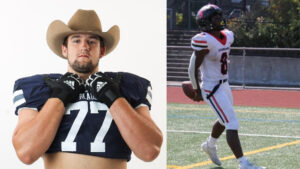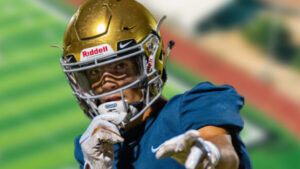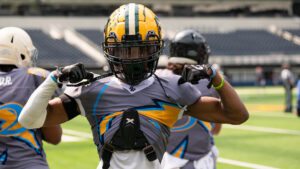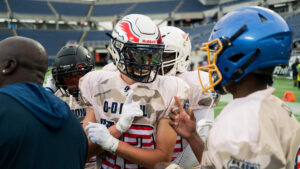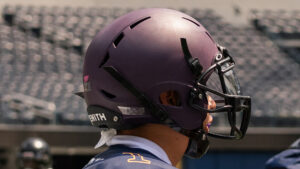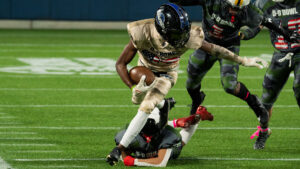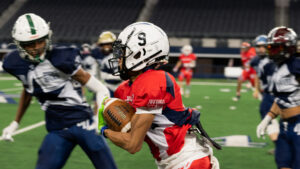The Line of Scrimmage Podcast is all about football! Tune in weekly to your host Coach Greg Quick to learn everything there is about the current state of football, history, top athletes, special guests and more on the all new podcast brought to by Offense-Defense Football.
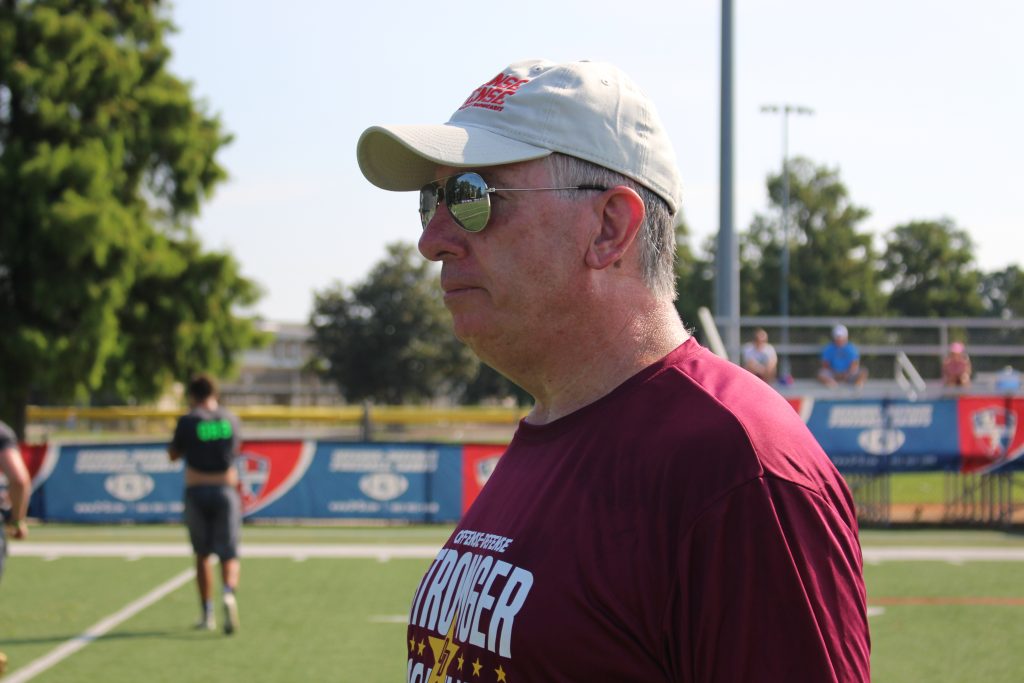
ABOUT COACH QUICK
Greg Quick is currently the Canadian Football League Director, Global Scouting. GQ has nearly four decades on the sidelines including high school, university and professional football. He has sixteen years as a university head coach in addition to coordinating both sides of the ball and tutoring linebackers to quarterbacks and everything in between. Coach Quick began his relationship with O-D in 1986. Greg and his wife, Jeannie, have six children and two grandchildren.
ABOUT THIS EPISODE
The Line of Scrimmage, Episode 4 –How Football Became Football!
This week Coach Quick takes us all the way back to the 19th century to really learn about the humble origins of the game of football we all know and love today. Tune in to hear his story and how history helps us understand changes today by learning from the past.
Speaker 2 (00:26):
Hello, this is the line of scrimmage where we go each week. One on one with the issues facing football today. Hello, I’m Greg quick and we’re powered by offense defense sports camps. I’m glad you’re here with me today to discuss the history of football. Why is football important? Why do we care about the history of football? What happened in the early 19th century and before? Why is that important to us today? I really believe that history helps us understand people in society. I believe history helps us understand change and how the current status quo came to be. I really believe that history provides us with identity. It’s really our history that helps us understand who we are. And I think most importantly to us today, history helps us in assessing past experiences of change. It is vital to us understanding change today through studying history, we have a better understanding of change, how best to enact change and how we can best a affect change today.
Speaker 2 (01:26):
You know, red Grange was a great football player in, uh, Illinois, and they’re getting ready to play Michigan and coach yolks. Did Michigan came out and said that red Grange, all he could do was run with the ball. Well, coaches upkeep was a head coach at Illinois at that time said he related red Grange after yo said, all you can do is run with the ball. He said, yeah, but the great opera singer Caruso, all he could do is say both these men had mastered their craft boast with both were at the top of their game. The great Russian composer. So Strack Avik said that football is the ballet of the masses. That football is the ballet, the masses, he was equating. He is a composer, the creator of this beautiful music that he wrote understood that the impact football has on society. And just as valet on that beautiful stage impacts high society.
Speaker 2 (02:24):
Football is the ballet of the masses. So if we understand history of the game, we understand the impact of sport of football on society. We understand the example of these men who mastered their craft and example that the art to society, we start to understand how history is vital to understanding change today. What did football start? When did games start? When did games with balls start over 6,000 years ago, there were balls in Scotland, balls carved out of rock, and they found these balls from neolithic period of Scotland and they’re carved balls. And these are the first record of some kind of a sport played with balls. If we flash forward to the ninth century, we’re going to start to see games being played with a ball that resemble our rude, a violent type of game of football. They were called a football they’re called mob ball, and you’re called camp ball.
Speaker 2 (03:25):
So these games obviously dealt with the camp, which was the city or the folk, the people of that region. And they were called mob ball. Cause it was literally two mobs fighting for a pig’s bladder. There was no limit of the number of people. And the idea was that they were going, I’m going to try and take that and we’ll play it until a Victor was made. So the folk from two different camps created these two mobs. Well, we’ll have mob a in mob B and mob, a had to take that pig’s bladder and try and move it by any means any means possible. Cross the fields across the road to the other city, to the other camp. And they had to fight that mob, right? Any way they could and a Victor, it was a team that could kick that pig’s bladder into the balcony of the opposing team’s church.
Speaker 2 (04:22):
So teammate and team B, this mob of people would fight for days, yes, and nights and weeks to get to the point where they have forward enough that they could get into the church and they could kick the ball into the balcony. Then I was like the first field goal, right? So we saw mob ball and football camp. All in that early ninth century was really the beginning of football. As we know it today, advancing a ball against an opponent and putting it through a goal. Really the beginning of the game of football, you know, we often talk about home field advantage. We all know the name of Newt Rockne. You know, when he first went to Notre Dame, his first season, they only had 56,000 people come to games. 10 years later, they had over 500,000 people come to the game. How did they gain that home field advantage?
Speaker 2 (05:18):
Well, one of the unique things that a new Rockne did is he would hire sports writers from the East. At that time, most of the population was in the East and no one really knew about Notre Dame and he’d hired sportscasters from the East and bring them out to Notre Dame and hire them as officials. He could, he would bring them in, hire them as officials that you could see the game firsthand. And then they would write stories back East. So from 50,000 to 500,000 fans, it was important that they gained that home field advantage. The other way that the home field advantage in 1869, Preston was playing Rutgers and the game was real, still a mob ball game. There would be 50, there were 50 people on the field, 25 on each team. And there was, there was no set rules. So the home team got to set the rules, therefore the home field advantage, but in the early 1870s in 1873, in fact, all the Ivy league schools came together except for Harvard does establish rules for the game of football.
Speaker 2 (06:27):
And Harvard played its own set of rules they pay, but what they call the Boston rules, which was more rugby based and arrested the Ivy league played association rules, which was more soccer based. So Harvard had nobody to play. So they had to go North of the border in 1874, they scheduled a game, a series of games with McGill university in Montreal and McGill and Harvard play. And the first game they played those Boston rules of Harvard. At the end of the game, it was three zero Harvard, Harvard one. They had the home field advantage. They played by their rules. The second game they played, they played by McGill’s rules, which were even more rugby based and allowed for the ball to be picked up and ran similar to what we do today. And in that game, they played for hours. And at the end it was declared a tie.
Speaker 2 (07:28):
So the home field advantage refers to gaining the advantage at home, obviously. And how did that happen? It happened through the rules of the game and through establishing a fan base like Newt Rockne did by hiring officials, uh, that were sports writers. You know, ODI has a storied history as well. ODI football camps, Rick and Val have had an Oak for over 25 years. It’s been in existence for 51 years. It’s the largest longest standing football camp, contact football camp in the country. You know, when they started, when Valley Ridge started, they only had a handful of camps. And now they have over 50 events, a year coast to coast border to border elite camps in the fall ball games in a winter development of camps in the spring and showcases in the summer there’s events for every age football and the advancement in the history of football is closely tied to ODI football camps.
Speaker 2 (08:35):
Thousands of college players have trained at the ODI events, whether it’s an elite camp, it’s a bowl game, developmental camps, summer showcases. Those players have gone on and played college football at every level and really around the world. And over 500 alumni of office defense football camps who have gone on to the NFL. What we know about offense, defense football cans from studying history is it has persisted in his grown through the last 51 years. And it has survived this pandemic and has come out the other side stronger than it went in. So I encourage you to attend one of the authentic defense football camp events go to [inaudible] dot com and register today. How did we get the name Gridiron? Where did Gridiron come from? Well, back in the late 19th century, and even before a grid, iron was the grid that was put over a fire. It had bars, it ran parallel. And then it had bars that ran along that held those parallel lines too.
Speaker 3 (09:48):
Yeah. And then,
Speaker 2 (09:50):
And that developed as we got into having stills, cold stoves and wood stoves, eventually electric, a guest stoves into a griddle. And that griddle had lines. As you know, the cooking grill has lines that run parallel we’ll football field. If you look at it from the top down, if you got in a drone and went above, you could see that grid, the early football, uh, that grid was even more prominent.
Speaker 3 (10:19):
And
Speaker 2 (10:20):
We, we don’t. Why, why are there five yard lights? Why were those grids put five yards apart? Cause back in the beginning, we talked about an 1874 when McGill and Harvard play well in the early 1880s, they started to establish more rules for the game of football and they had three downs to go five yards. And that’s why we have the five yard lines and the 10 yard lines. And the hashes are actually like that iron bars that ran below the grid of parallel bars on a, that was used to cook on a fire. Therefore, the Gridiron, the name Gridiron was born because the field looked like a cooking grid.
Speaker 2 (11:09):
You don’t want, at that same time, we talked about three tries for five yards. And as you know, in Canada, the CFL, they still play $3, but even more so if you go back to football and why it was called football, because you could kick the ball early on and then you could carry the ball and then you could throw the ball in the 1880s, a touchdown cottage for points and field goals were five points. Having the ability to kick the ball through the uprights, being harassed by the opponent with limited, uh, with strength was more difficult than getting a touchdown. You don’t, we’re all interested in professional football and professional football really started in 1882 when Pudge finger was paid $500 to play a game. You know how much that is today? You have any idea. What that said is today, he got paid $13,246 to play professional football in 1882, a lot of money today, a lot of money then, but that’s what a professional football really started.
Speaker 2 (12:18):
You know, um, there are a lot of traditions in football, a lot of traditions. And one thing you often hear is when a roster changes and they, you use the antidote of who’s going to fill their shoes. Is this guy good enough to fill their shoes? Where did that come from? How did that start? Well in the late 19th century, the earliest 20th century, the most valuable piece of equipment was a player’s shoes. Only the best players. Hey, choose not everyone could afford a pair of football shoes. So only the best, most valuable players on the team had shoes. And the shoes, oftentimes the soul was a thick leather, maybe an inch thick of leather, or they drove nails through the soul with these shoes. They were very, very valuable. So when it came time for a player to leave the game and they’re getting ready to retire, or their eligibility had expired and they were no longer going to be part of the team, they would have a ceremony.
Speaker 2 (13:25):
And that player that outstanding, that MVP would give their gift of their shoes to the man. They hoped would fill their shoes, literally. So if they’re a running back, they might give it to the next, running back and tell him to fill his shoes. And they would literally wear those shoes. And that’s where that term came from. It was a sign of respect who could fill their shoes. You know, uh, Harvard used to have a tradition that on a Monday, the first Monday of school, the freshmen and the sophomores would play it. It was called bloody Monday and it was played on the Delta of the Harvard campus today. It’s where Memorial hall is on campus, but that used to be an open expanse. And they would play in a game, was played in masses. As we know, even as late as, you know, 1869, they still were playing with 25 men to his side.
Speaker 2 (14:25):
So the freshmen and sophomores would play a game of football, a bloody game of football, and they would play and they would smash it when they were done. There were broken noses and broken legs. I bet you can’t. You just see these guys helping each other off the field Crow somewhere on crutches, some would have bandages on their heads. Some would be blood coming down their face and dirt streaked with sweat. Well, there was a poem written about bloody Monday and bloody Monday, uh, was remembered by those sophomores and freshmen because it was competition. And that’s how important Harvard, one of the great academics institutions, a world. And last week we talked about recruiting. We talked about competitive desire and they even knew at Harvard in 18 hundreds, how important that competitive desire was not only in sport, but academic endeavor in any endeavor in mastering your craft, whether it was like in the comparison of red Grange to the great opera singer Caruso who both mastered their craft, or is a great Russian composer comparing the ballet to football, that football is the ballet of the masses.
Speaker 2 (15:53):
That competitive desire is really the gift or the part of football. That is so important. When we understand the history and understand what, what is vital and have a vital understanding of the change needed today is because we understand history. And from what we’ve talked about today, we understand that it’s that competitive desire that we learned through sport that is so important. So if we think about those men and the sweat and the blood that they gave on bloody Mondays, to help them develop the competitive and establish the competitive desire necessary to succeed, to master their craft, it teaches us a strong lesson. And that’s why history is so important. Red Grange, Caruso, Russian composer, valet, who would think that all those things coming together, home field advantage, what is a grid, iron football mob ball, camp ball, Boston rules, home field advantage, fill my shoes.
Speaker 2 (17:11):
All those things would teach us, help us assess we by assessing those past experiences of change, we now find what is vital to understand as we try to enact change today, not only in the game of football, but in society. So in closing today, I’d like to share with you a poem that was written about bloody Mondays, the freshmen’s wrath to softs the dire full spraying of shins. Unnumbered bruised great goddess saying, I think it’s important for us to sing the praises of the game of football and understand that competitive desire that we build through football is important to change today, to overcome the challenges today in society. It’s important that we live the example of the competitive desire that’s learned through the game of football. Thanks for being here. I hope that this study of history has helped you in understanding what we need to do to enact change today. And I hope you’ve given you a glimpse of how this great game of ours was developed. You have a great day. Thank you for listening.
Speaker 1 (18:25):
God bless
